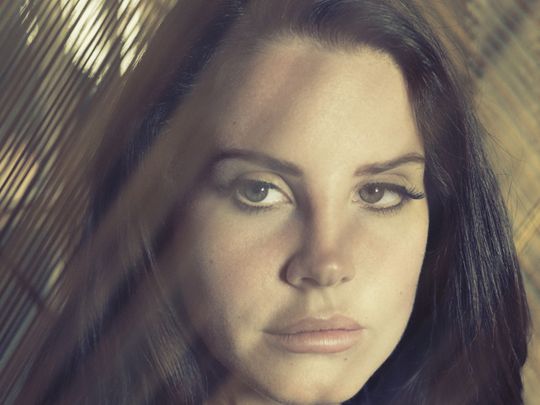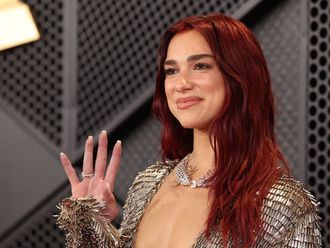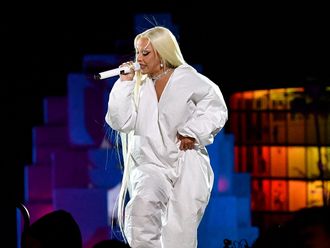
Anyone as obsessed with California as Lana Del Rey is — obsessed with its beauty and its glamour and with the potential for danger that’s always underbellied the swollen promise of this place — was probably destined for a Laurel Canyon phase, and that’s just where we find the singer on her stirring and emotionally risky new album, ‘Norman F _ Rockwell!’
She might be the decade’s least likely pop star: a believer in slooow tempos who concentrates on albums at a moment when bite-size singles predominate. But where others can struggle to outlive a viral smash, she offers fans entree into a fully realised world. Which means she’s free to evolve at her own idiosyncratic pace.
The follow-up to 2017’s ‘Lust for Life’, which featured cameos by the Weeknd and ASAP Rocky, Del Rey’s fifth major-label studio disc surrounds her breathy singing with stately piano and gently fingerpicked acoustic guitar; it’s a quieter, more hand-played effort than her earlier work that went for a hip-hop torch-song vibe and made her a favourite of Kanye West, whose wedding she performed at in 2014.
In ‘Bartender’, she describes a party where the “ladies of the canyon” are listening to Crosby, Stills & Nash, while ‘Venice [expletive]’ evokes that veteran band’s ‘Our House’ as she sings, “You’re in the yard / I light the fire.” (Later she borrows the title of Neil Young’s ‘Cinnamon Girl’.)
For Del Rey, who famously assembled her breakthrough “Video Games” clip from found footage, all these references are the latest product of her ongoing rummage through California’s history; no doubt she’ll eventually get deep into the Gold Rush.
Yet she and her primary producer, Jack Antonoff, are also looking back at Laurel Canyon’s folk-rock fantasy of domestic bliss as a way to deepen Del Rey’s own songs about reaching for, and occasionally attaining, the kind of romantic intimacy that’s eluded her in the past.
You wouldn’t call the album happy exactly but tracks such as the tender ‘Love Song’ and “[Expletive] It I Love You” represent a clear shift from the gloomy fatalism that so distinguished Del Rey when she emerged in the early 2010s as an alternative to the cheerful likes of Kesha and Katy Perry
“You write, I tour, we make it work,” she sings of a relationship between two creatives in “Venice Bitch.” “You’re beautiful and I’m insane.”
Why the turn toward the light? Del Rey is 34, for one — mature enough by today’s slow-to-grow standards that the old stories about Joni Mitchell and Graham Nash are probably beginning to hold some appeal. (She guards her personal life pretty tightly, so we’re left to presume these songs bear some connection to reality.)
But Del Rey is also a proven dissenter, and nearly 10 years after she released her debut album, ‘Born to Die’, its influence is unmistakable in music by Ariana Grande, Lorde and Billie Eilish. No less influential is her cut-and-paste visual style, which is impossible not to think of every time the opening credits to HBO’s ‘Succession’ come on screen.
What stands out now _ in an era defined by bleary, depressive pop songs — is someone yearning, as Del Rey does in ‘Venice Bitch’, for ‘Hallmark — one dream, one life, one lover’.
Or her insistence in the scrummy ‘Mariners Apartment Complex’ that “you took my sadness out of context.”
The gratifying thing about this album — beyond its gorgeous melodies and Del Rey’s singing, which has never been more vivid — is that even as she’s mellowed her attack, her sense of humour has grown more pointed. The title track is somehow both sensitive and merciless in its description of a “man-child” who talks to the walls when his friends get bored of him.
“Why wait for the best when I could have you?” she wonders over a handsome arrangement lush with horns and strings.
And for all her interest in the idea of creating a home — “You don’t ever have to be stronger than you really are when you’re lying in my arms,” she comforts a lover in ‘California’ — Del Rey isn’t blocking out the world outside. Near the end of ‘The Greatest’, in which she sings longingly about a bar where the Beach Boys used to go, she strings together a series of short lines that together offer a chilling portrait of life in 2019:
LA is in flames, it’s getting hot
Kanye West is blond and gone
‘Life on Mars’ ain’t just a song
I hope the live-stream’s almost on
Antonoff keeps playing a little piano lick after that, each repetition slightly softer than the one before it. It feels like a cushion Del Rey knew you’d need.













